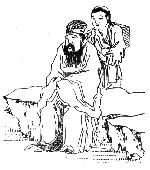I never was into punk rock; I was here in NYC while it was coming about; I've written all about that aspect of my wolf ways in One Spring Morning Off Spring Street (33 posts over in the Archives there). I delved into punk after rediscovering rock writer Lester Bangs and our once crossing paths; I've read Lester's books on Debbie Harry and Rod Stewart and a lot of his CREEM articles and reviews--I loved the way Lester wrote but I never really loved any of the music or the bands or the personalities he wrote about. I was once in the old Tramps club here in NYC house band and got fired because of my dislike of David Johanson, who at the time I came to musical blows with him, was calling himself Buster Poindexter and ripping my love, the blues, apart with his phony baloney pretentious bullshit--a totally white-up-your-ass attitude about a uniquely American form of music, a music you once played wearing the best clothes you could afford, snappy brim hats, cool suits and ties, lots of bling (yep, all the early bluesmen loved their jewelry), and singing the pure music that came out of the earth they knew intimately while working as an enslaved bunch of human beings who were considered "work animals" and sung from the kind sweetness of their forever-looking-for-escape-from-the-South, and soon these blues preachers were broadcasting their sung newspaper articles on how-to-survive after you're once-a-slave and then you're freed but you're not really freed, sung newspaper articles of direction sung by men and women who'd been escaping slavery through the music for many moons, singing those blues newspaper articles on how to escape the South, what routes to take (Highway 81), and what trains to take (the Illinois Central, the Rock Island Line, the Gulf, Mobile & Ohio) or hell, you might take a Cadillac, you might take a train, but if you have to walk, you're gettin' there just the same.
Robert Johnson sung about "Sweet Home Chicago." Then later Herman "Junior" Parker had a hit with "Sweet Home" in the 1950s. And Chicago became the goal of the Southern escapees--and I'm doing all this rambling just to enforce my feelings that punk rock was a white rebellion against this "freedom" music. The punkers's attitude was, "Shit, the blues are just three changes over and over and we whiteys are more complicated than blacks anyway...." See where I'm going? [John Cale was a classically trained violist as you'll read below.]
Well, anyway, punk rock was to me the very opposite of the music I was in bed with and trying to perpetuate and having but minor luck at a musical success until one gig where when I started singing my opening blues the whole room got up and left the premises and I realized the punkers had won; the Amurican mockers and the foppy Brits had won; I was finished as a blues musician. The punkers would one day finish, too, but with white privilege they went on to fame and much fortune--all of them seedy has beens now--most of 'em dead and gone like Lester Bangs.
Anyway, this is a pretty cool history of punk; well written and very informative. The boy's done his homework--mentioning some bands I totally fail to ever remember. Here's the link, so enjoy. The author's name is A.S. Van Dorston.
http://www.fastnbulbous.com/punk.htm
We Close With Some Chinese Translation by Our Pal Ez
From Shih-ching, the Classic Anthology Defined by Confucius:

From Book 7. Songs of Cheng [Ez's note: "Banish the songs of Cheng." K'ung, the Anthologist. "K'ung-fu-tsy seems to have regarded the tunes to these verses as a species of crooning or boogie-woogie."]
I
Live up to your clothes,
we'll see that you get new ones.
You do your job,
we'll bring our best food to you'uns.
If you're good as your robes are good
We'll bring you your pay and our best food.
Nothing too good, bigosh and bigob
For a bureaucrat who will really
attend to his job.
II
Hep-Cat Chung, 'ware my town,
don't break my willows down,
The trees don't matter
but father's tongue, mother's tongue
Have a heart, Chung,
It's awful.
p. 37, Third Printing, 1976, Harvard U. Press.
Have a nice day.
thegrowlingwolf
for The Daily Growler





No comments:
Post a Comment